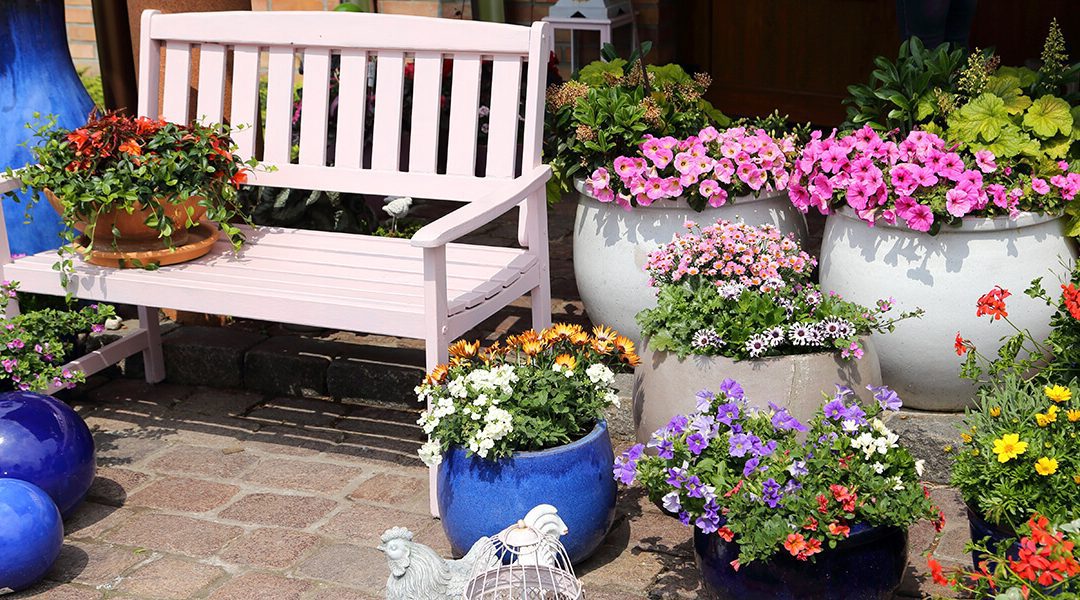General Tips for Container Gardens of Any Size
No matter the size of your container garden, these tips will ensure that your arrangement lasts through the summer!
Opt for Plants with Similar Needs
It’s a common rookie mistake to design your planter purely based on aesthetics without considering the light, moisture, and feeding needs of your container plants. Ensure that each plant thrives with roughly the same amount of sunlight, the same watering frequency, and similar fertilizer rates. Containers are small, enclosed environments, so it’s virtually impossible to satisfy three plants that all need different things!
Consider All Angles
Build your container like a pyramid, not a painting! In other words, keep in mind that your arrangement may be viewed from multiple angles, so your arrangement should look great from any perspective. Keep taller plants in the center, shorter trailing plants around the edges, and mid-sized mounding plants in between.
Avoid High Wind Locations
Wind can throw a wrench into your container design; it can knock down smaller containers or damage tall plants like cannas and tropical hibiscus. Keep these arrangements near a wall to protect them. Potted trees are often strong enough to withstand some higher wind, but their containers will need to be weighed down at the base with a heavy material such as pea gravel or stone.
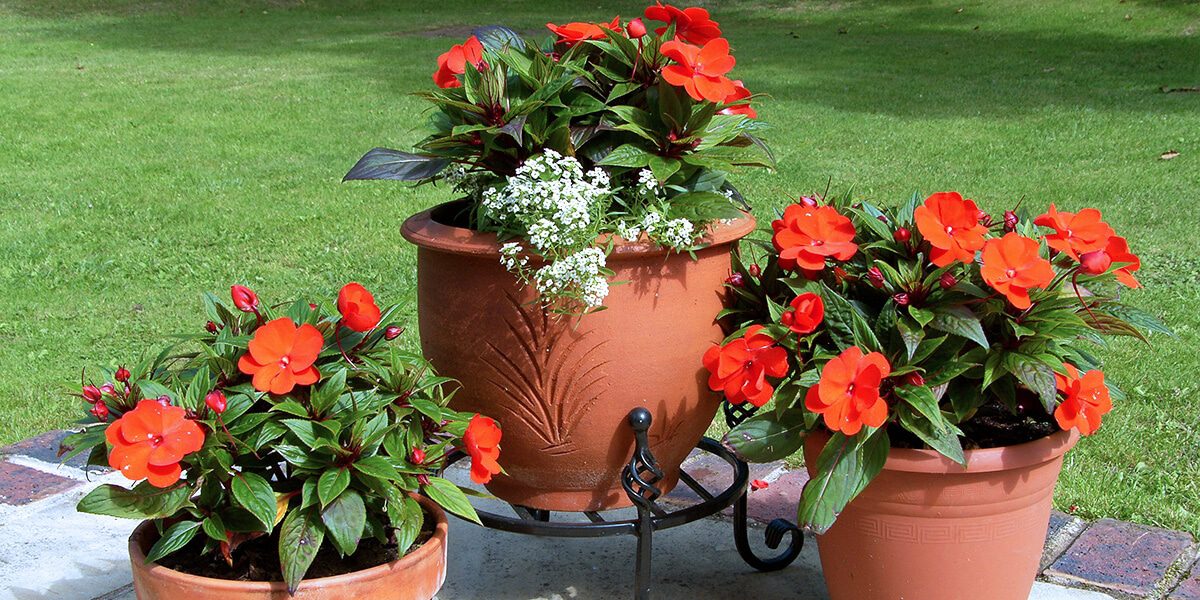
Design Ideas for Small Planters
Don’t underestimate the power of a small pot! Compact planters (10” or less) are a key part of any well-rounded garden design, and they make it possible to dress up tighter spaces where large pots wouldn’t fit. Try these smart ideas for your small garden planters:
Choose Plants Wisely
Small pots, naturally, have limited space, so your plant selection is key. Choose a single plant that will fill the space beautifully, such as lantanas or geraniums, or blend up to three compact species that won’t over-compete for space or attention.
Create an Outdoor Centerpiece
In many ways, small outdoor planters can be treated like indoor vases. A beautiful container is a fabulous accent for the center of your patio dining table or the coffee table of your outdoor conversation set. A small but attractive pot overflowing with flowers instantly sets a welcoming mood in the space!
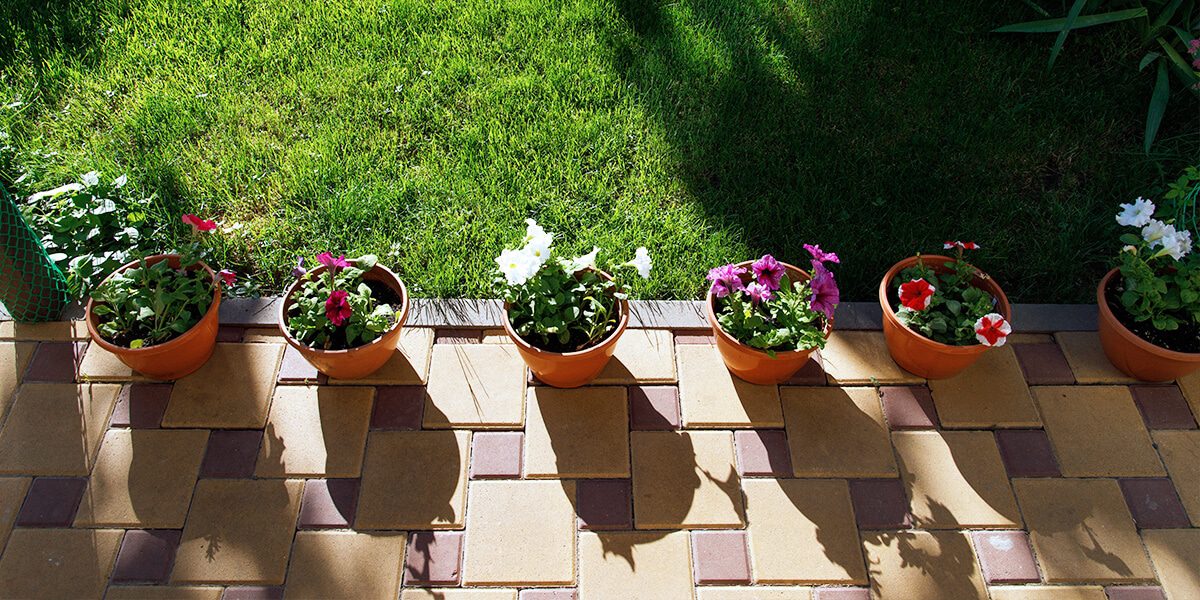
Mix and Match
A group of three single-species containers can pack all the impact of a larger container garden! Consider placing groups of 3 or 5 small containers on the corner of your patio or front deck to create a visually intriguing design. Use stools, crates, or stumps to add levels to your design, and choose plants in the same family (such as three different types of succulents) or in an attractive color palette (like white, lilac, and deep purple) to pull the design together.
Experiment with Color Echo
Smaller containers, especially hanging baskets, are some of the best candidates for playing with plants that share color characteristics. The right combination of all-pink, all-purple, or all-yellow flowers can make an impressive statement! For example, try blending two calibrachoa cultivars in different shades of the same color family to make a fun, dimensional design.
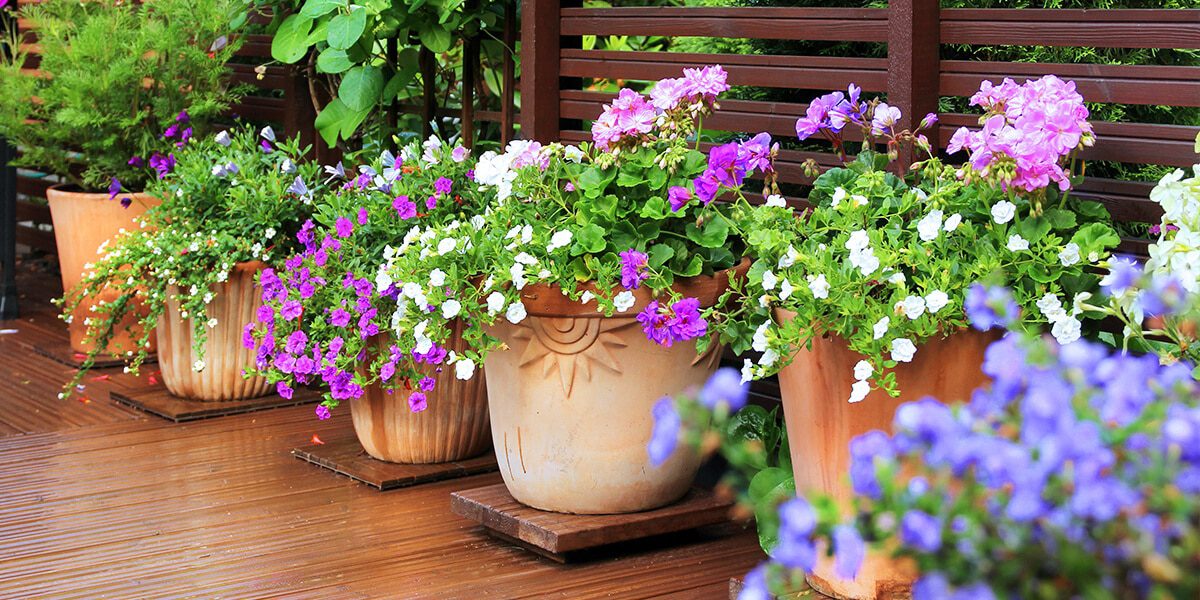
Planting a Mid-Sized Container Garden
Mid-sized planters between 10” and 16” are the most commonly used for container gardens. This makes it easy to create a great design, but just as easy to fall back onto old habits! Hoping to mix up your mid-sized container garden design this year? Try these ideas!
Go Wild with Texture
Everyone loves a pretty flower, but great texture really makes people stop and stare! Look for highly-textured plants to act as your container “thrillers,” such as ornamental grass or gomphrena. The unexpected shapes will draw more attention to your overall design.
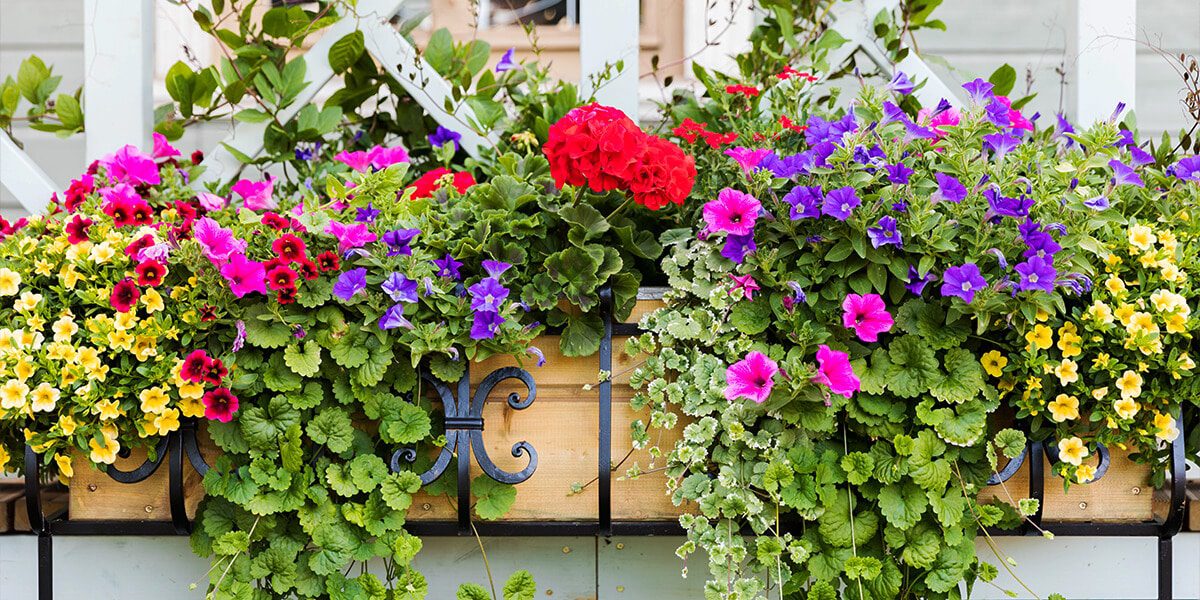
Create Complex Designs
You may be familiar with the “thriller, filler, spiller” design principle, but what if you want to work with more than three plants? With all arrangements, you’re looking to create balance and contrast. You can balance a four-plant arrangement with an extra filler, and a five-plant arrangement with an extra spiller. Just make sure to choose plants that complement the others well in terms of color, texture, and height.
Get in Formation
It’s not just what you plant; it’s where! Even if you’ve chosen a great combination of plants, it matters how you arrange their placement. The plants should first be spaced out so that they’re well-distributed throughout the container space.
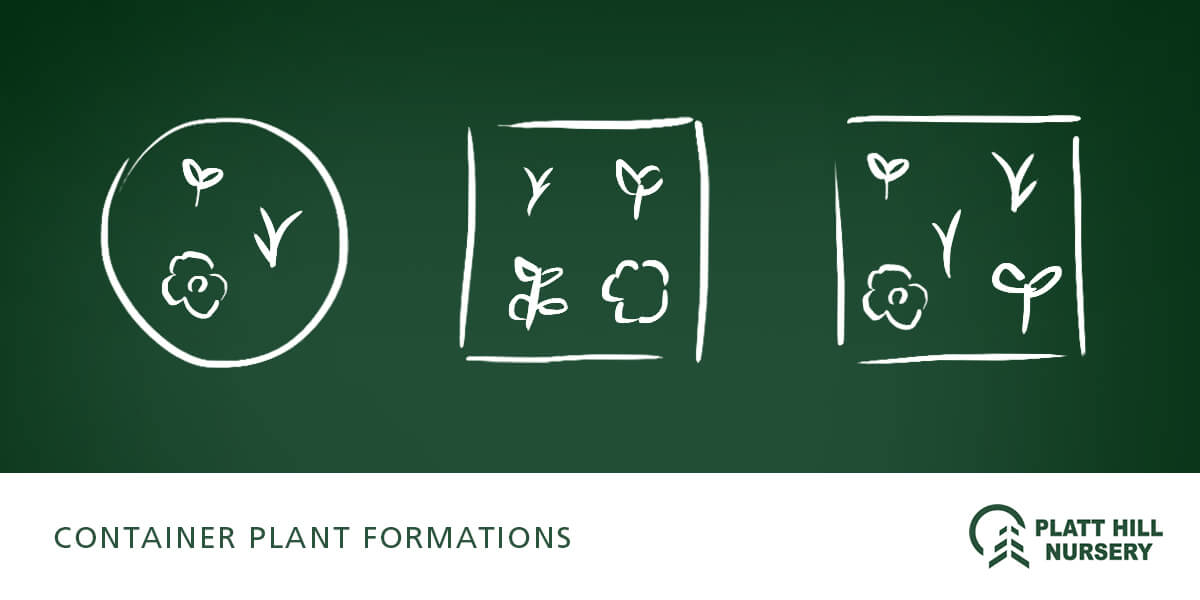
For example, in round or square garden planters, 3-plant arrangements could be planted in a triangle formation near the container edges, four-plant arrangements could be planted in a square formation, or five-plant arrangements could be planted in a square formation with one in the center. Lastly, the role of the respective plants should be respected, i.e. “thrillers” near the back, “fillers” near the center, and “spillers” closest to the front edge.
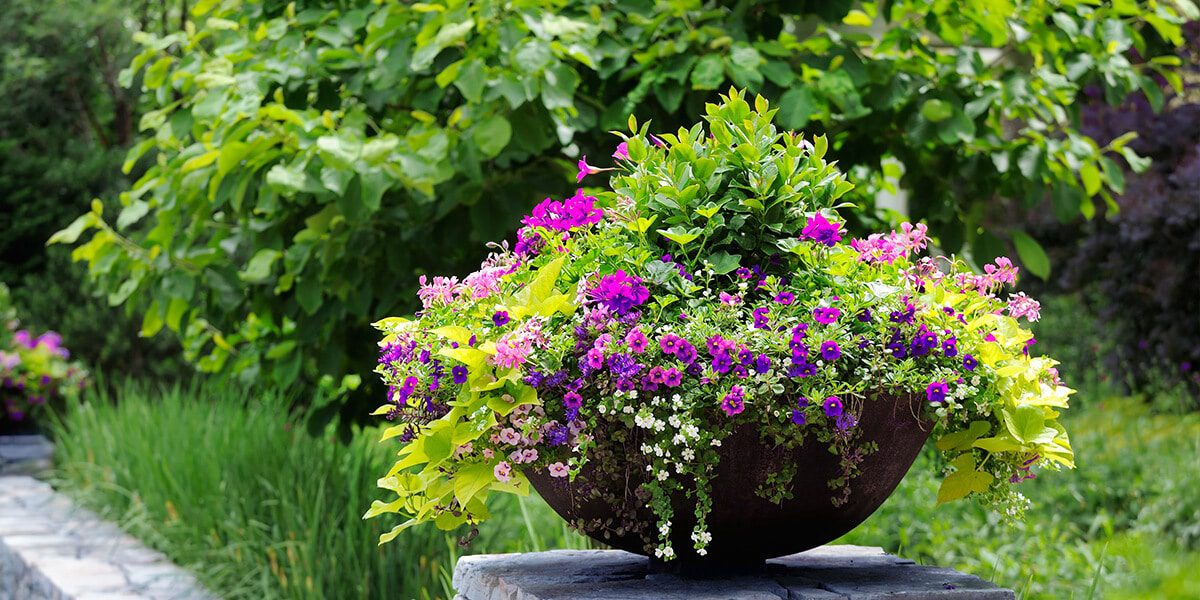
Design Tips for Large Garden Planters
Happened across a really big pot that you just had to have? Sometimes it can be overwhelming trying to figure out how to fill all that space! Here’s some inspiration for garden planters bigger than 18”.
Put It On Wheels
Before you start thinking of the design inside the planter, think about the role of the pot in the design of your garden! Putting a large container on a dolly or a sturdy platform with casters will allow you to easily reposition it throughout your yard. This can be essential for days when you need to move the container somewhere more sheltered.
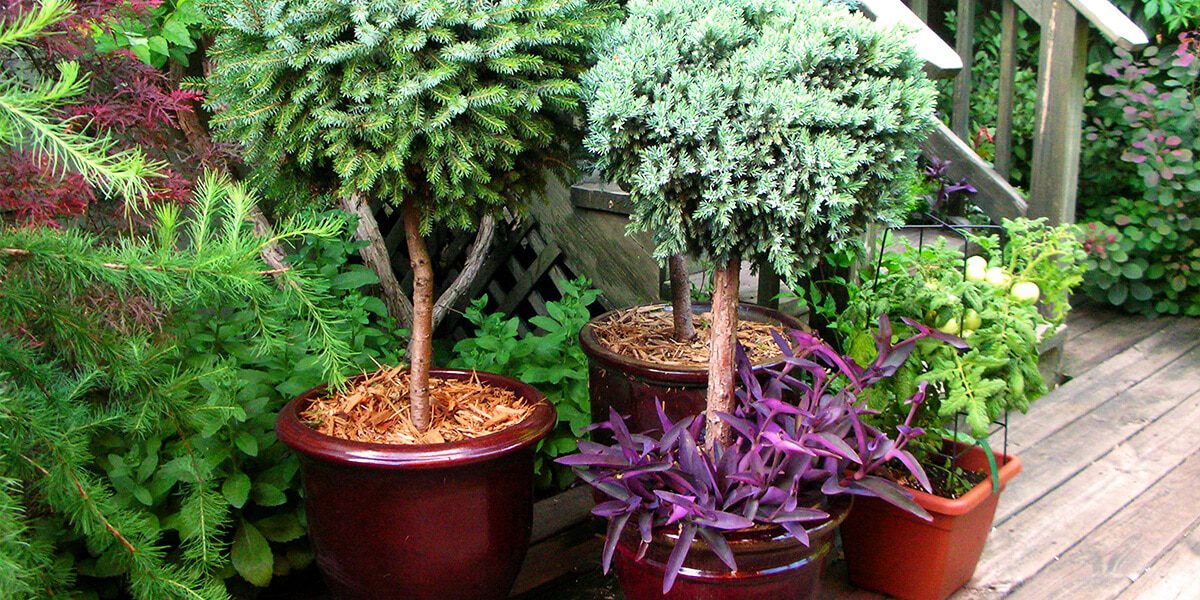
Grow a Dwarf Tree
These large planters are absolutely perfect for growing small specimen trees that otherwise might struggle in your landscape. For example, if most of the soil in your yard leans very alkaline and you yearn to grow an acid-loving Japanese maple, it’s much easier to control the soil environment in a container than in your ever-changing landscape.
Create a Stunning Focal Point
These large garden containers instantly draw attention, so why not try something totally different that will really stand out in your garden? For example, a large bowl-shaped planter can make a beautiful water garden one year, then be transformed into a super-modern vegetable garden the next. Or, you can create an ultra-high impact arrangement with larger-scale plants; imagine a towering alocasia for your “thriller”!
Need more inspiration? Visit us at Platt Hill Nursery! Our team members are experts at helping you find perfect pairings, or the perfect pot, for your container gardening goals.
Platt Hill Nursery is Chicago’s premier garden center and nursery.

